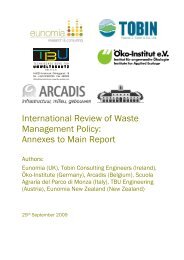Report of the Local Government Efficiency Review Group
Report of the Local Government Efficiency Review Group
Report of the Local Government Efficiency Review Group
You also want an ePaper? Increase the reach of your titles
YUMPU automatically turns print PDFs into web optimized ePapers that Google loves.
8.4.6 Instead <strong>of</strong> each local authority having its own ICT unit, <strong>the</strong>y could<br />
increasingly buy some (or all) <strong>of</strong> <strong>the</strong>ir ICT products and services from a<br />
consolidated central group. When properly executed, <strong>the</strong> greater <strong>the</strong><br />
amount <strong>of</strong> consolidation, <strong>the</strong> greater <strong>the</strong> savings that are likely to result. It is<br />
worth noting that up to 70% <strong>of</strong> ICT budget goes to infrastructure and<br />
operational services.<br />
8.4.7 It is no longer necessary to have people located where <strong>the</strong> infrastructure<br />
resides as today’s technologies allow for infrastructure to be managed from<br />
anywhere with a network connection. Instead <strong>the</strong> focus should be on<br />
ensuring an appropriate allocation <strong>of</strong> responsibilities to <strong>the</strong> party best able to<br />
manage <strong>the</strong>m.<br />
8.4.8 The areas that should be addressed through consolidation, frameworks and<br />
aggregated purchasing include ‘functional’ applications supporting specific<br />
service areas and common ICT services.<br />
8.4.9 Functional applications are those service-specific ICT applications (such as<br />
planning, water, housing etc) as well as corporate services and which are<br />
common across <strong>the</strong> sector. To support this service would require<br />
development, operation, maintenance and support <strong>of</strong> ICT applications that<br />
deliver or support core sectoral business.<br />
8.4.10 Common ICT services include o<strong>the</strong>r ICT services required by all local<br />
authorities, such as:<br />
• Network services – provision and management <strong>of</strong> local and wide area<br />
network connectivity and capacity;<br />
• Infrastructure services – identity management/ directory services,<br />
server management, system administration, security, contingency/<br />
business continuity/ disaster recovery, capacity management;<br />
• Desktop services – provision to all users <strong>of</strong> a workstation with web<br />
browser and access to both common and line <strong>of</strong> business applications;<br />
• Common application services – provision and management <strong>of</strong> <strong>the</strong><br />
range <strong>of</strong> common applications available to all users, such as email,<br />
diary/ scheduling, contacts, word processing, spreadsheet,<br />
presentation, document/record management, video conferencing,<br />
instant messaging;<br />
• Common web services – hosting <strong>of</strong> external websites, access to<br />
<strong>Government</strong> Gateway, portal management, intranet hosting, content<br />
filtering, content management.<br />
8.4.11 <strong>Local</strong> authorities should build on <strong>the</strong> positive work done thus far in <strong>the</strong>se<br />
areas, with a view to maximising economies <strong>of</strong> scale and return for <strong>the</strong><br />
taxpayer. The <strong>Group</strong> endorses <strong>the</strong>se efforts and believes that progress<br />
should be made in o<strong>the</strong>r relevant areas as soon as <strong>the</strong> relevant<br />
assessments and pilots are carried out to show that <strong>the</strong> investment required<br />
will yield real cost savings. Consideration should also be given to<br />
examining potential synergies with <strong>the</strong> wider public service.<br />
90
















